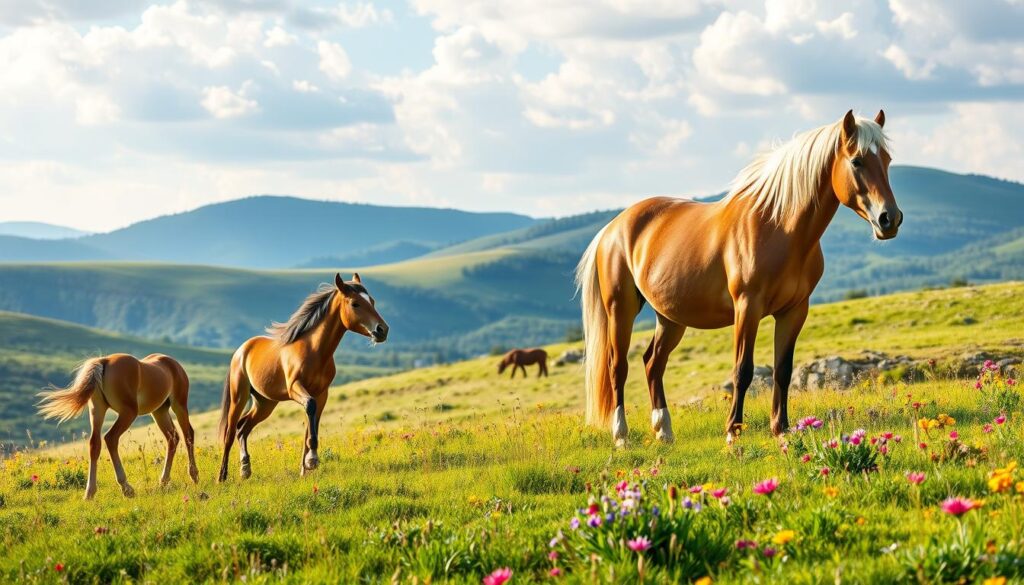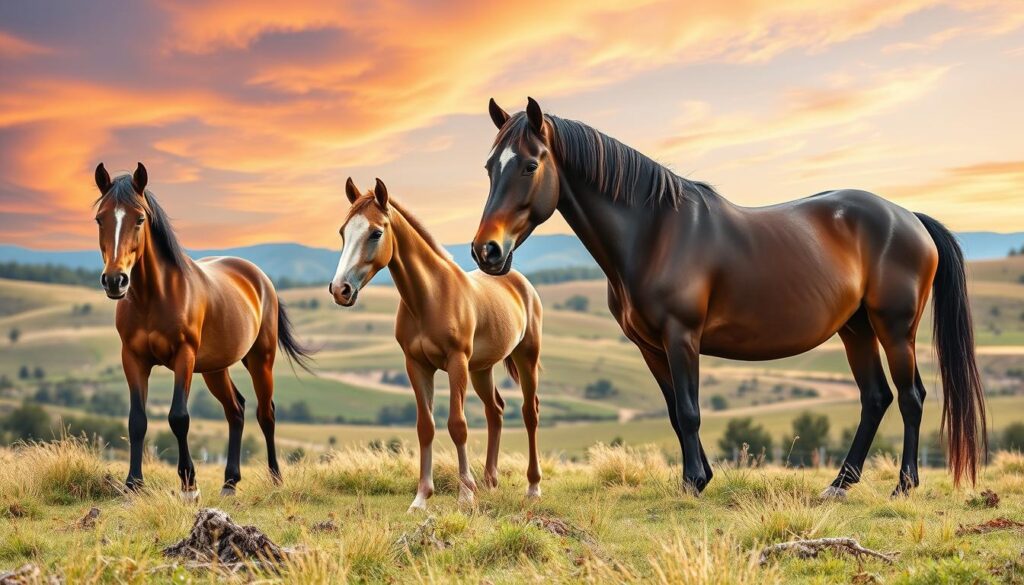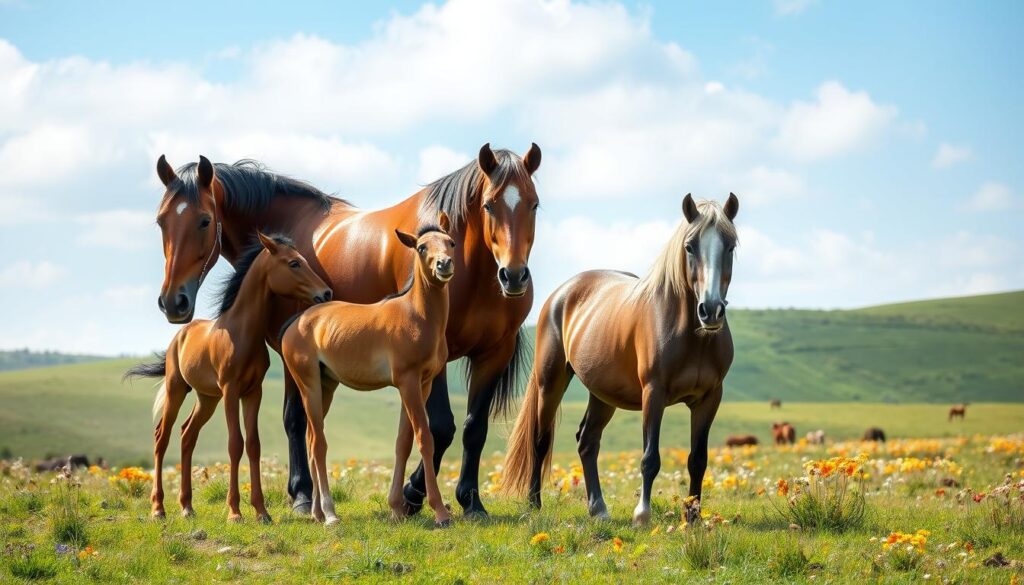Table of Contents
Horses have amazed people for centuries. They come in many breeds, each special in its own way. But, how long do horses live? The answer is not simple, as many things can affect a horse’s life span.

Key Takeaways
- The average lifespan of a horse is around 25-30 years, but some horses can live up to 40 years or more.
- Factors such as breed, genetics, diet, and veterinary care can significantly impact a horse’s longevity.
- Proper nutrition, regular exercise, and attentive veterinary attention are crucial for extending a horse’s lifespan.
- Remarkable cases of equine longevity demonstrate the resilience and adaptability of these beloved animals.
- Understanding the stages of a horse’s life and recognizing signs of aging can help owners provide the best care for their senior horses.
This article explores what affects a horse’s lifespan. It covers their life from being a foal to being a senior horse. By learning about this, readers will understand how to care for their horses for a long and happy life.
Introduction: Understanding the Average Horse Lifespan
Horses are known for their strength, grace, and friendship. Knowing how long a horse lives is key to caring for them well. The horse lifespan varies, but learning about it helps us understand their health and care needs.
In the United States, horses usually live between 25 to 30 years. Some breeds and horses can live longer. Their long lives show how strong and adaptable they are. Horses have been important in our history and still bring joy to our lives today.
| Horse Breed | Average Lifespan |
|---|---|
| Arabian | 25-30 years |
| Quarter Horse | 25-35 years |
| Thoroughbred | 25-28 years |
| Clydesdale | 20-25 years |
Knowing the typical horse lifespan helps owners and lovers make better choices for their care. This ensures horses live a happy and healthy life.

Factors Affecting a Horse’s Lifespan
The lifespan of a horse is shaped by several factors. These include its breed and genetics and its diet and nutrition. Knowing these elements helps us see why some horses live longer than others. It also shows how important a balanced diet is for a horse’s health and long life.
Breed and Genetics
Different horse breeds have different average lifespans. This is because of their unique genetics and physical traits. For example, Miniature Horses often live longer than bigger breeds like Clydesdales.
Genetics also play a part in a horse’s lifespan. Some breeds are more likely to get certain health problems. These can affect how long they live.
Diet and Nutrition
A horse’s what is the lifespan of a horse is closely linked to its diet and nutrition. A good diet full of nutrients, vitamins, and minerals is key. It helps keep a horse healthy and happy.
Things like the quality of food, the right amount of grains and concentrates, and clean water matter. They all help a horse live a longer life.
| Breed | Average Lifespan (years) |
|---|---|
| Miniature Horse | 25-35 |
| Arabian | 25-30 |
| Quarter Horse | 25-35 |
| Clydesdale | 15-20 |
| Thoroughbred | 25-30 |
By knowing about the horses lifespan factors, horse owners can help their horses live longer and healthier lives. This includes understanding breed, genetics, diet, and nutrition.

Stages of a Horse’s Life
Horses go through different stages as they grow up. Each stage has its own special traits and needs. Knowing these stages helps us understand a horse’s lifespan and health.
Foal and Yearling Years
The first year of a horse’s life is very important. Foals, or young horses under one year, need lots of care. They rely on their mothers and need good food and social time.
As they get older, into their yearling year, horses start to be more independent. They learn to move and act like adults.
Adulthood and Senior Years
When a horse is about 3-4 years old, it reaches adulthood. At this stage, they can live a long and active life. Their average lifespans are 25 to 30 years, depending on their breed and other factors.
As they get older, horses need more care. They may have health issues that need attention. This helps them stay happy and healthy.
Knowing about a horse’s life stages helps us take better care of them. It ensures they live long, happy lives.
Caring for Senior Horses
As horses get older, their care becomes more important. Senior horses need special attention to stay healthy. This ensures they can enjoy their later years.
Senior horses have different dietary needs. Their metabolism slows down, making it hard to digest some nutrients. A senior-specific diet helps keep them healthy and prevents nutritional problems.
- Ensure a diet rich in high-quality forage, such as timothy or orchard grass hay, to support dental and digestive health.
- Supplement the diet with a senior-specific feed or pellets that are formulated to meet the unique nutritional needs of older horses.
- Monitor their body condition regularly and adjust the diet as needed to maintain a healthy weight.
Proper hoof care is also crucial for senior horses, as their hooves may become more prone to issues like cracks, chips, or laminitis. Regular farrier visits and proactive hoof management can help prevent these problems and keep senior horses comfortable and sound.
Senior horses also need gentle exercise and physical therapy. This helps keep their muscles and joints flexible. Activities like hand-walking or light riding are good, but always check with a vet first.
“Caring for senior horses requires patience, attention to detail, and a deep understanding of their unique needs. With the right care and management, these wise equine companions can continue to thrive in their later years.”
Regular vet visits and preventative care are key for senior horses. This includes dental exams, vaccinations, and parasite control. By being proactive, owners can help their horses live a better life.
Horse Lifespan in Relation to Human Years
Many people wonder about the how long do horses live and how it compares to humans. This comparison helps us understand how long these magnificent animals live.
A horse age in human years is about 1 horse year to 3 human years. For example, a 10-year-old horse is like a 30-year-old human in terms of age and maturity. But, remember, this is just a rough guide. The how long does a horse live can change based on many things like breed, diet, and health.
- A young horse, or foal, is roughly equivalent to a human toddler or child.
- An adult horse in its prime is akin to a middle-aged human.
- A senior horse may be comparable to an elderly human, requiring specialized care and attention.
Knowing how horse and human years relate can help a lot in caring for these animals. It lets owners and caretakers make better choices about food, exercise, and vet care. This ensures their horses stay healthy and happy for a long time.
“A horse is the projection of peoples’ dreams about themselves – strong, powerful, beautiful – and it has the capability of giving us new perspectives and attacking new patterns of thought.”
Oldest Recorded Horse Ages
Horses usually live between 25 to 30 years. But, some horses have lived much longer. These cases show how long horses can live with the right care and food.
Oldest Recorded Horse Ages
The oldest horse ever was a Mongolian horse named Old Billy. He lived an amazing 62 years. Born in 1760, Old Billy’s life shows how strong and adaptable horses can be.
Shayne, a Welsh Cob, lived to be 51 years old. His owners say his long life was due to great care, a good diet, and lots of exercise.
Longevity in Different Breeds
- Miniature horses can live into their 40s and 50s.
- Appaloosa horses, with their unique spots, often live into their 30s or 40s.
- Arabian horses, known for their endurance, can live into their 30s or 40s too.
These stories of long-lived horses inspire us to care for them well. They show us the potential and strength of these amazing animals.
| Horse Name | Breed | Lifespan |
|---|---|---|
| Old Billy | Mongolian | 62 years |
| Shayne | Welsh Cob | 51 years |
| Miniature Horses | Miniature | 40-50 years |
| Appaloosa Horses | Appaloosa | 30-40 years |
| Arabian Horses | Arabian | 30-40 years |
Signs of Aging in Horses
As horses get older, they show physical and behavioral changes. These changes are signs of aging. Knowing these signs helps owners care for their horses better.
One clear sign is a graying or whitening coat, especially around the muzzle and eyes. This happens as pigment cells decrease with age. The skin also gets thinner and more wrinkly, showing less elasticity.
- Decreased muscle tone and reduced ability to maintain body weight
- Diminished vision and hearing, making the horse more cautious and less responsive
- Slower reaction times and reduced agility, making the horse more prone to accidents
- Increased stiffness and joint pain, especially in the hind legs
- Changes in dental health, leading to difficulty chewing and decreased appetite
- Alterations in sleep patterns, with more frequent napping and less time spent standing
Recognizing these signs of aging in horses helps owners make better choices. They can ensure their senior horses live comfortably. Regular vet visits, special diets, and gentle exercise are key to their well-being.
Extending a Horse’s Lifespan
The average horse lifespan can vary for many reasons. However, there are ways to help your horse live longer. Giving them the right nutrition and exercise is key. Also, preventative care and regular vet visits are important for their health.
Proper Nutrition and Exercise
Feeding your horse a balanced diet is vital. It should match their age, breed, and how active they are. A good diet keeps their immune system strong and their joints healthy. Exercise, like riding or training, keeps them fit and happy.
Preventative Care and Veterinary Attention
Seeing the vet regularly is essential for a long, healthy life. This includes dental care, shots, deworming, and taking care of their hooves. Catching and treating health problems early can make a big difference.
By focusing on proper nutrition, exercise, preventative care, and vet visits, you can help your horse live a long and happy life. This ensures they have a great quality of life, even in their older years.
Honoring a Horse’s Life: End-of-Life Considerations
Knowing when a horse’s life is coming to an end is hard but important. As owners, we must care for them until the very end. This part will help you understand how to honor your horse’s life with kindness and respect.
When you’re facing the loss of a horse, having a supportive group around you is key. Talk to your vet for advice on keeping your horse comfortable. Also, connecting with other horse owners who have gone through this can offer comfort and advice.
Choosing the right time for euthanasia is a personal decision. It should be made with your vet’s help. Consider your horse’s quality of life, pain, and overall health. Remember, ending a horse’s suffering is a kind act, though it’s not easy.
After your horse passes away, you might want to remember them in a special way. You could make a memorial, like a plaque or garden, or hold a small ceremony. Sharing stories and photos with friends and family can also help celebrate your bond with your horse.
Dealing with a horse’s end-of-life journey is tough, but with empathy and care, you can celebrate their life. This way, your horse’s memory will live on.
“The bond between a human and a horse is a sacred one, forged through trust, understanding, and a shared journey. Honoring that bond, even in the final chapter, is a testament to the profound impact our equine companions have on our lives.”
Conclusion: Appreciating the Beauty of a Horse’s Life Journey
Horses add so much to our lives. They start with endless energy in their foal and yearling years. Then, they grow into wise seniors. Their journey shows us the power of resilience and grace.
Knowing how long horses live helps us care for them better. We can give them the right nutrition and exercise. We also need to watch their health closely with preventative care and veterinary attention. Taking care of them is our big responsibility.
Seeing a horse’s life is a special gift. It shows us how short life is and how precious every moment is. By understanding this, we can connect deeper with them. This connection brings us great joy and enrichment.
FAQ
How long do horses typically live?
Horses usually live between 25 to 30 years. Some breeds and individual horses may live longer.
What factors affect a horse’s lifespan?
Several factors can influence a horse’s lifespan. These include its breed and genetics. Also, diet, nutrition, and care play a big role.
How does a horse’s age compare to human years?
Horses age differently than humans. One year of a horse’s life is like 3-4 years for a human. So, a 25-year-old horse is like a human in their 70s or 80s.
What are the stages of a horse’s life?
Horses go through distinct stages. These include the foal and yearling years, adulthood, and their senior years. Each stage needs special care and management.
How can I care for a senior horse?
Caring for senior horses requires special attention. You need to focus on their diet, exercise, and veterinary care. This ensures they thrive in their golden years.
What are some remarkable cases of equine longevity?
There have been cases of horses living well into their 30s and even 40s. The oldest recorded horse lived to be 62 years old.
How can I extend my horse’s lifespan?
To extend your horse’s lifespan, provide proper nutrition and regular exercise. Also, focus on preventative care and attentive veterinary attention. This ensures a high quality of life for your horse.